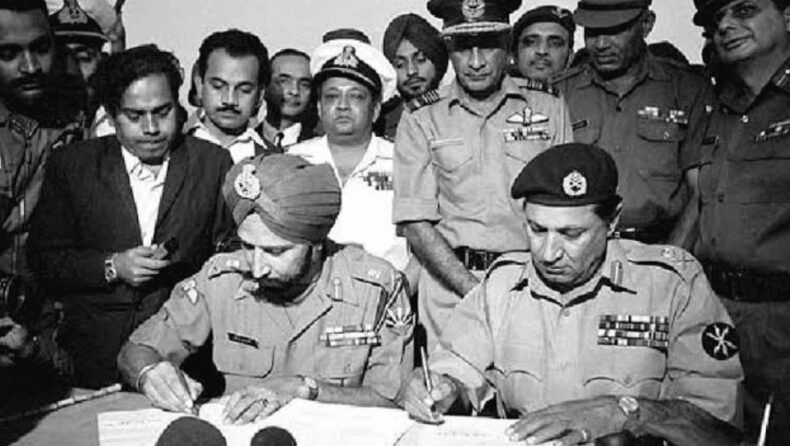Vijay Diwas, honouring India’s victory over Pakistan which paved the way for the birth of Bangladesh in 1971, is commemorated on December 16. Indian leaders, PM Narendra Modi, President Droupadi Murmu, and Defence Minister Rajnath Singh expressed their tribute to the Indian army on their respective social media pages.
Indo-Pak war of 1971 which was fought for a short span of thirteen days, created a huge impact on both countries and it led to the liberation of Bangladesh.

After the partition, when two Independent countries, India and Pakistan, were formed, Pakistan had to face the most imminent problem, the geographical separation between West Pakistan and East Pakistan. Though there were many commonalities between the two and united by name, problems arose in terms of administration.
To name Urdu, being a common language in West Pakistan, was made an official language and it was not welcome by the people in East Pakistan and they considered it only as an imposition.
West Pakistan was also said to have an upper hand in terms of administration and policies-making which led to leaders like Sheikh Mujibar Rahman from the East protesting against the policymakers and this apparently led to form their own league named Awami League which won a swooping of 160 of 162 seats in 1970 elections.
Soon after the elections, the Awami League, by gaining integrated support from people from the east, started demanding autonomy in terms of administration. The geographical disconnect further deepens the drift between the west and the east.
Though Sheikh Mujibar Rahman, the leader of the Awami League, (who is known as the founder of Bangladesh), won the majority, Zulfikar Ali Bhutto from Pakistan People’s Party, who won only 81 seats of138 in west Pakistan, was made the Prime Minister.
On March 25, 1971, the Pakistan Military took over East Pakistan which is present-day Bangladesh, and there was a mass slaughter of people. In response to this genocide, there was an exodus and a huge mass sought refuge from India.
India took its stand with East Pakistan (the present day Bangladesh) by supporting the Awami League, calling for an international invention, as the Pakistan Army targeted Bengalis and Hindus in East Pakistan.
Triggered by India’s stand with East Pakistan which led to the liberation of Bangladesh on 26th March 1971 Pakistan struck the first blow against India by attacking eleven of its air bases on December 3, 1971. The then Prime Minister Indira Gandhi, as a response, called for an emergency and declared war against Pakistan.
The Joint forces, the Indian army targeting Karachi Port in the West and Bangladesh’s Mukti Bahini attacking the East, fought against Pakistan for thirteen days, resulting in the surrender of Pakistan’s armoured forces along with their Chief, General Amir Abdullah Khan Niazi.
The Instrument of Surrender Treaty was signed by Niazi on 16th December 1971 in Dhaka. According to sources, about 3,800 soldiers lost their lives on both sides. Around 93,000 Pakistani prisoners of war were released on August 2, 1972, when India and Pakistan signed the Shimla Agreement.

Indian Leaders Commemorating Vijay Diwas:
PM Narendra Modi took to his official Twitter account, paying tribute to the Jawans on this historically significant day.
President Droupadi Murmu, on her Twitter handle, paid homage to the soldiers who lost their lives in the war.

Rajnath Singh, marking the day’s significance visited the war memorial to pay homage to the Indian armed personnel who lost their lives during the war.












